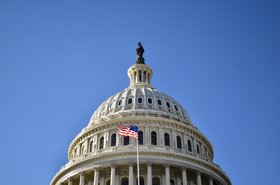The UK's National Audit Office (NAO) has released a report detailing issues with the government's technology procurement processes.
First reported by ITPro and The Register, the NAO report suggests that costs have overrun by as much as £3 billion ($3.67bn), along with 29 years of cumulative delays in IT projects.
According to the report, the annual spend on digital programs and technology in the UK is as much as £14bn ($17.13bn), of which £3bn ($3.7bn) is an increase in cost to reset programs and operate legacy systems for longer than planned in five digitalization programs assessed.
"Our work over the last decade has shown that [the] government’s attempts at digital transformation have had mixed success. Former flagship major transformation programs have failed to deliver results as expected," notes the report. "The center of government sets the overall direction, culture, and conditions, but individual departments award contracts to suppliers and subsequently manage them. It is at this departmental level where problems, arising from the overall commercial and contracting environment and processes, are most likely to manifest themselves."
The NAO goes on to cite the changing technology market as a factor, with increasing reliance on "big tech" for cloud services and artificial intelligence capabilities, adding that "just three very large multinational providers now have a combined global market share of over 60 percent of cloud services provision."
"Traditional models of outsourcing or creating government-owned assets are giving way to subscription-based models such as the use of cloud services, and [the] government has been slow to adapt how it engages with and manages suppliers," said the NAO, adding that a comprehensive sourcing strategy is needed for dealing with cloud providers that are "bigger than governments themselves," while aligning with policies on research and innovation.
The NAO also pointed to the ongoing Competition and Markets Authority investigation into the cloud services market, noting the complexity surrounding changing cloud providers.
The CMA’s market research found that “[s]witching cloud providers is seen as the equivalent of moving other kinds of infrastructure, such as moving house or moving a business from one country to another. It is not something to undertake lightly or consider at all unless it leads to significant business benefits long term that overrides the perceived cost and risk of changing.”
Because of this, efforts to avoid reliance on a single cloud provider, or a service only offered by one provider, involve greater technical complexity and high overall cost.
Among other issues noted by the NAO is "a focus on short-term delivery horizons can mean insufficient attention is paid to fundamental issues" such as contingency, interoperability with, and dependency on, existing solutions. In addition, experts are "sometimes engaged on a short-term contractual basis," which risks the government prematurely losing access to the essential skills and capabilities needed.
Geoffrey Clifton-Brown, MP and chair of the Public Accounts Committee, said: "Digital commercial skills are in short supply, and government is not making the most of the limited expertise it has. The government has managed digital suppliers poorly, and the center of government has not provided direction to help departments become intelligent clients.
"The Public Accounts Committee has long maintained that technology can transform the way government delivers public services. Without a more strategic approach from the center, and a sourcing strategy that is fit for purpose for the digital age, the government risks wasting more money and squandering the opportunity to modernize the public sector."
This is the second time this month that Government technology procurement strategies have faced criticism. HM Revenues & Customs, the UK's tax collector, reportedly spent £3.8 billion ($4.67bn) on contracts with tech suppliers over the last five years, of which £591 million ($726.85m) excluded competition. The department is still seeking to modernize its IT estate for a digital tax system while using IT service providers it secured deals with now more than 20 years ago.
In June 2023, a former civil servant turned whistleblower told the TaxPayers' Alliance: "The ongoing use of legacy systems in government is a disgrace and completely inexcusable. We move at such a slow pace that it seems only to get worse… The problem is so bad that some of these systems could be taken down by an enthusiastic child."
Read the orginal article: https://www.datacenterdynamics.com/en/news/uk-national-audit-office-report-outlines-issues-with-govt-cloud-contracts/









